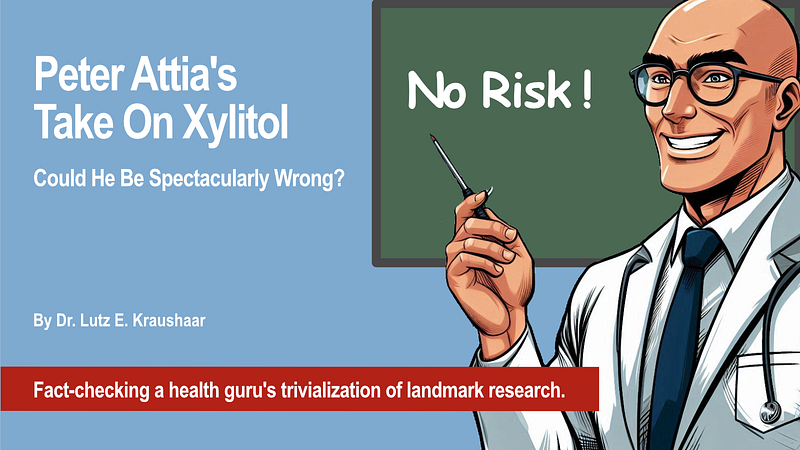The Xylitol Controversy: Is Peter Attia Wrong About New Research?
Written on
Understanding the Xylitol Debate
Recently, a prominent health figure has downplayed a significant study revealing that xylitol, a highly popular sweetener, may elevate the risk of heart attacks and strokes. This finding is critical, particularly since xylitol is often marketed to individuals who already face heightened cardiovascular risks.
As we delve into Peter Attia's perspective on this matter, it's essential to scrutinize whether his views align with scientific evidence.
Nutrition Research: A Double-Edged Sword
Nutrition studies serve various purposes, from guiding dietary recommendations to helping coaches and healthcare providers advise their clients. However, this domain can also be manipulated by health influencers aiming to attract attention through sensationalized claims. The recent blog post by Dr. Peter Attia critiques a paper published in the June 2024 issue of the European Heart Journal, which was characterized by its editorial team as a serious warning regarding the cardiovascular implications of both endogenous and exogenous xylitol.
Attia's dismissal of these findings is surprising, prompting a deeper examination of his arguments and their implications for public health.
Questioning the Research
Leading into his critique, Attia notes that the study's design seemed familiar to him, hinting at skepticism. While he did not outright claim the research was fraudulent, his wording suggested a troubling connotation about the study's validity. As someone well-versed in health research, I recognize that a significant portion of published studies can be flagged as potentially unreliable. This context raises questions about the credibility of Attia's perspective.
While the research team behind the xylitol study utilized a method previously effective in highlighting risks associated with erythritol, Attia's insinuation that the design was somehow flawed is unfounded. This meticulous approach, which links in-vivo and in-vitro experiments to their observational findings, should be regarded as exemplary.
Evaluating Attia's Arguments
Attia argues that it is incorrect to conclude that xylitol consumption heightens the risk of blood clots and related cardiovascular events. He correctly notes that dietary xylitol is not the only source of xylitol in the body, as it is also produced through metabolic processes. However, he questions whether the researchers adequately focused on dietary xylitol's role in the observed risks.
His logic implies that xylitol levels measured in participants may stem from natural body production rather than dietary intake, challenging the validity of the association with major adverse cardiovascular events (MACE). Yet, this reasoning overlooks the evidence that increased xylitol levels can cause enhanced blood clotting, regardless of the source.
Moreover, Attia suggests that the rapid clearance of dietary xylitol from the bloodstream invalidates its potential as a risk factor. However, dietary habits of individuals replacing sugar with xylitol indicate that elevated levels could persist throughout the day.
Reassessing the Implications
Attia also contends that the study's experiments fail to establish causality, as the research primarily relies on observational data. However, the authors conducted comprehensive mechanistic studies, including experiments on mouse models and platelet-rich plasma. While Attia criticizes the relevance of these models for human cardiovascular disease, the strain used is recognized as a valid model for such conditions.
His argument about the inadequacy of platelet-rich plasma as a representation of human blood is also flawed. The researchers did indeed test whole blood, where similar activation responses were observed.
What Lies Ahead?
Attia's conclusion that there is no harmful effect from circulating xylitol, irrespective of its origin, is a position that raises concerns. If I were at risk for MACE, particularly due to conditions like diabetes or cardiovascular disease, I would be cautious about consuming sweeteners like xylitol.
While not all blood clots lead to severe outcomes, increasing the likelihood of clotting through dietary choices seems unwise, especially when alternatives are readily available.
A Personal Reflection
I felt let down by Attia's analysis, as I had previously respected his work. His critique of observational studies holds merit, but dismissing the xylitol research as flawed does not. His approach to health improvement remains largely based on associations rather than causative evidence.
In contrast, I advocate for a more hands-on approach, encouraging clients to engage in self-experimentation grounded in evidence. The findings from the xylitol study, which suggest potential risks for vulnerable populations, warrant careful consideration rather than dismissal.
